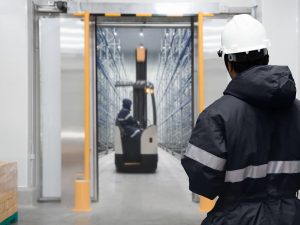Efficient cold storage solutions are an integral part of commercial kitchens. As a leading provider of refrigeration equipment and HVAC filter products, Cafco Services understands the importance of following best cold storage practices in ensuring food safety and quality. Here are some guidelines to ensure the effectiveness of your cold storage processes.

Selecting the Right Food Vendors
The safety of food storage begins with the delivery of ingredients to your establishment. It is critical to choose food vendors known for reliable transportation, especially when dealing with perishable goods. Prompt and proper delivery helps prevent spoilage and ensures the integrity of the cold chain, saving your business from potential losses and food safety issues.
Streamlining the Cold Chain Process
It’s critical to have efficient movement of products within the cold chain. Any form of delay can cause vulnerabilities, leading to the spoilage of items. Analyze and improve your processes to remove any bottlenecks, ensuring the swift transfer of goods to and from your storage facilities.
Proper Storage Solutions
For optimal food safety, the right storage solutions must encompass more than just low temperatures. Your cold storage areas should have features like adequate locking doors and rust-proof wiring. HVAC companies specializing in commercial refrigeration like Cafco Services can assist in ensuring your storage facilities are up to standard.
Organizing for Optimal Cold Storage
In a commercial kitchen, different food items require specific temperatures. Vegetables may need a different storage temperature compared to dairy and meats. Factors like these need a careful division of temperature zones within your storage area. Implementing partitions and utilizing appropriate containers can aid in managing these temperature variances effectively.
Avoid the Temperature Danger Zone
Cold storage per USDA guidelines implies keeping your refrigerated storage spaces at temperatures between 32 to 40 degrees Fahrenheit. Regular maintenance and monitoring are vital, as temperatures outside these ranges can result in rapid bacterial growth, doubling the amount in just 20 minutes.
Labeling and FIFO Implementation
Label all items with clear and legible dates and adhere to a first-in, first-out (FIFO) policy. This practice ensures that older stock is used before newer stock, reducing food waste and the risk of serving spoiled food.
Maintaining Equipment and Environment
It’s important to ensure the proper maintenance of commercial refrigeration systems, especially cold storage units. Enlist a reliable refrigeration equipment services team to conduct regular checks and promptly repair any issues. This proactive maintenance can prevent costly disruptions and promote longevity in your equipment’s life span.
Packaging for Cold Storage
When freezing food, use the correct packaging to prevent freezer burn. Utilize freezer bags for frozen items, as standard plastic bags may not provide adequate protection against air entry, which can lead to spoilage.
Mastery of cold storage best practices is paramount in commercial kitchens in certain local businesses, be it restaurants, hotels or other similar establishments. By following these guidelines, you can ensure food safety, reduce waste, comply with health regulations, and ultimately save on costs. For all your commercial refrigeration services, turn to Cafco Services. Call us at (513) 242-3400, or fill out our contact form today.
